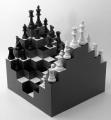Yes, most Westerners "think" the North Korean populace (oops, too vague?) is "plenty dissatisfied". Certainly we would be if we were all transported to that nation and asked to live under that government. Their populace, however, was not transported there, has little awareness of how things are elsewhere, and we really have few accurate measures of how they actually feel about their situation.
You miss the point of the power of the image transmitted around the globe of the man facing the tank if you only measure it by the immediate tactical effect on Chinese reaction to reisistance. The strategic effect is what I speak of, on a global scale, and such things take time. Even revolutions are really little more than rapid periods of action within a much longer, slower process of cultural, social, political evolution. China is changing and the government there has no more ability to stop that there than governments do anywhere. Governments who persist too long in such efforts typically fall. Fear is indeed a powerful tool in keeping a populace in line, but at some point action overcomes fear. Every government knows they are little more than a lone man with a six shooter holding back the mob. This works until it doesn't work, at which point the mob wins (minus 3-6 who sacrifice for the whole).
As to what the President would focus on in his conversation with Assad? That is hardly worth speculating on here. The key is that he understand the dymanic at work and that he works to convince Assad that his Cost/Benefit equaition has changed, and that by changing his approaches from what "worked" (suppressed, not cured) for his father will he the son exceed his father as the one who leads Syria to a new future, rather than merely being one of a long line of leaders dedicated to holding Syria to an increasingly obsolete past.











Bookmarks